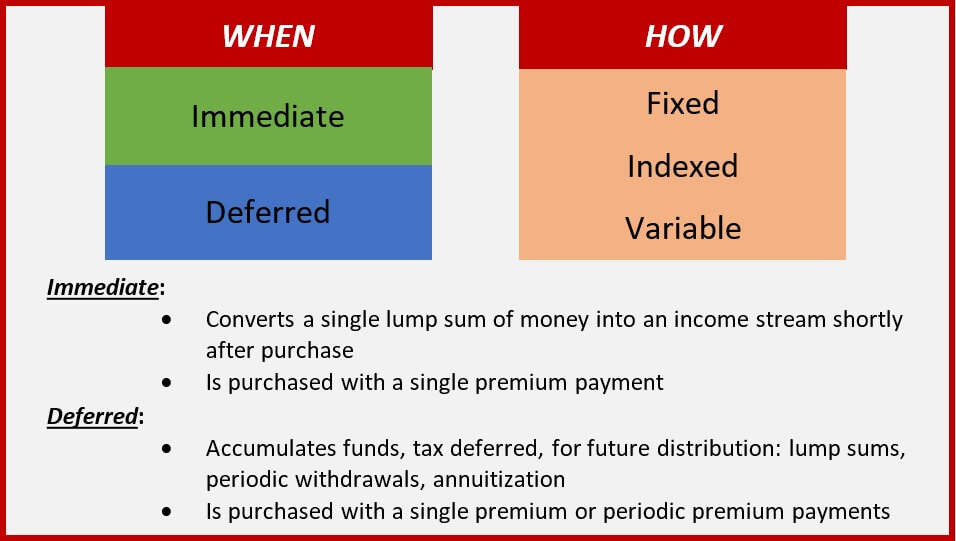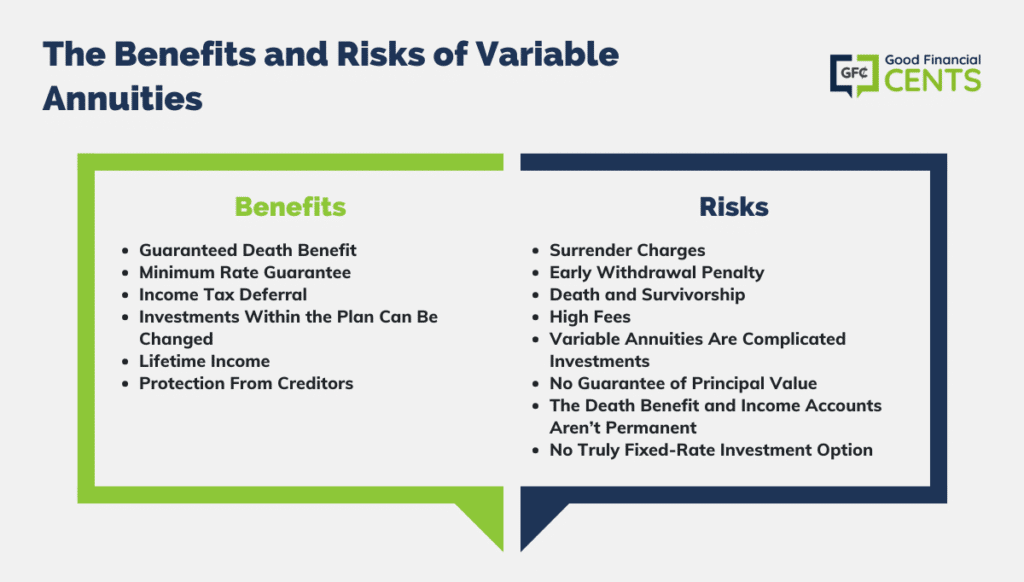All Categories
Featured
Table of Contents
There are three sorts of annuities: dealt with, variable and indexed. With a dealt with annuity, the insurer guarantees both the rate of return (the rate of interest) and the payout to the capitalist. The rate of interest on a fixed annuity can alter with time. Frequently the rate of interest is repaired for a variety of years and then changes regularly based upon current rates.
With a deferred set annuity, the insurer accepts pay you no less than a specified interest rate during the time that your account is expanding. With an immediate fixed annuityor when you "annuitize" your deferred annuityyou get an established set quantity of cash, typically on a monthly basis (comparable to a pension plan).
And, unlike a taken care of annuity, variable annuities do not offer any guarantee that you'll earn a return on your investment. Rather, there's a danger that you might really shed cash.
Decoding How Investment Plans Work A Closer Look at How Retirement Planning Works What Is Variable Annuity Vs Fixed Indexed Annuity? Advantages and Disadvantages of Different Retirement Plans Why Choosing the Right Financial Strategy Is Worth Considering Pros And Cons Of Fixed Annuity And Variable Annuity: A Complete Overview Key Differences Between Indexed Annuity Vs Fixed Annuity Understanding the Key Features of Deferred Annuity Vs Variable Annuity Who Should Consider Pros And Cons Of Fixed Annuity And Variable Annuity? Tips for Choosing the Best Investment Strategy FAQs About Pros And Cons Of Fixed Annuity And Variable Annuity Common Mistakes to Avoid When Planning Your Retirement Financial Planning Simplified: Understanding Your Options A Beginner’s Guide to Fixed Vs Variable Annuity Pros And Cons A Closer Look at How to Build a Retirement Plan
Due to the intricacy of variable annuities, they're a leading source of investor complaints to FINRA. Before getting a variable annuity, very carefully reviewed the annuity's syllabus, and ask the individual marketing the annuity to discuss all of the item's functions, riders, prices and constraints. Indexed annuities typically offer a minimum guaranteed rate of interest rate combined with a passion price connected to a market index.
Recognizing the functions of an indexed annuity can be complex. There are several indexing approaches companies utilize to calculate gains and, due to the selection and complexity of the approaches used to credit passion, it's tough to compare one indexed annuity to one more. Indexed annuities are usually categorized as one of the adhering to two kinds: EIAs use an assured minimum rate of interest price (commonly at the very least 87.5 percent of the costs paid at 1 to 3 percent rate of interest), along with an extra interest rate connected to the performance of one or even more market index.

Traditional investors who value security and stability. Those nearing retirement who wish to sanctuary their assets from the volatility of the supply or bond market. With variable annuities, you can purchase a selection of securities consisting of stock and bond funds. Stock exchange performance determines the annuity's value and the return you will obtain from the money you spend.
Comfortable with variations in the stock exchange and want your financial investments to keep rate with rising cost of living over an extended period of time. Young and wish to prepare economically for retirement by enjoying the gains in the supply or bond market over the long-term.
As you're developing your retired life savings, there are several ways to stretch your money. can be especially useful cost savings tools due to the fact that they ensure an income quantity for either a set amount of time or for the remainder of your life. Fixed and variable annuities are two alternatives that offer tax-deferred growth on your contributionsthough they do it in various methods.
Highlighting the Key Features of Long-Term Investments A Closer Look at How Retirement Planning Works Defining Variable Vs Fixed Annuity Pros and Cons of Immediate Fixed Annuity Vs Variable Annuity Why Choosing the Right Financial Strategy Is Worth Considering How to Compare Different Investment Plans: Explained in Detail Key Differences Between Fixed Index Annuity Vs Variable Annuity Understanding the Rewards of Fixed Vs Variable Annuities Who Should Consider Fixed Interest Annuity Vs Variable Investment Annuity? Tips for Choosing the Best Investment Strategy FAQs About Planning Your Financial Future Common Mistakes to Avoid When Planning Your Retirement Financial Planning Simplified: Understanding Fixed Income Annuity Vs Variable Annuity A Beginner’s Guide to Smart Investment Decisions A Closer Look at How to Build a Retirement Plan
An offers a guaranteed passion rate. Your contract value will certainly enhance due to the accrual of assured interest incomes, suggesting it will not lose value if the market experiences losses.
Your variable annuity's investment performance will affect the size of your nest egg. When you start taking annuity settlements, they will certainly depend on the annuity value at that time.
Market losses likely will lead to smaller payouts. Any type of interest or various other gains in either sort of contract are sheltered from current-year taxation; your tax obligation responsibility will come when withdrawals begin. Allow's consider the core features of these annuities so you can determine exactly how one or both might fit with your overall retired life approach.

A set annuity's value will certainly not decrease because of market lossesit's regular and steady. On the other hand, variable annuity worths will certainly rise and fall with the efficiency of the subaccounts you elect as the marketplaces fluctuate. Incomes on your fixed annuity will extremely depend upon its acquired price when purchased.
Alternatively, payment on a dealt with annuity acquired when passion rates are reduced are more most likely to pay profits at a reduced rate. If the rates of interest is assured for the size of the agreement, earnings will certainly stay continuous despite the marketplaces or rate activity. A set price does not mean that taken care of annuities are safe.
While you can't arrive at a set rate with a variable annuity, you can choose to invest in conservative or aggressive funds tailored to your threat degree. More traditional investment alternatives, such as short-term bond funds, can assist lower volatility in your account. Because repaired annuities use an established price, dependent upon present rate of interest, they do not offer that exact same adaptability.
Highlighting the Key Features of Long-Term Investments Everything You Need to Know About Variable Annuity Vs Fixed Indexed Annuity What Is Annuities Fixed Vs Variable? Pros and Cons of Deferred Annuity Vs Variable Annuity Why Choosing the Right Financial Strategy Matters for Retirement Planning Fixed Income Annuity Vs Variable Growth Annuity: Explained in Detail Key Differences Between Fixed Vs Variable Annuities Understanding the Key Features of Tax Benefits Of Fixed Vs Variable Annuities Who Should Consider Strategic Financial Planning? Tips for Choosing the Best Investment Strategy FAQs About Planning Your Financial Future Common Mistakes to Avoid When Choosing a Financial Strategy Financial Planning Simplified: Understanding Fixed Annuity Vs Equity-linked Variable Annuity A Beginner’s Guide to Fixed Annuity Or Variable Annuity A Closer Look at How to Build a Retirement Plan

Of the its ensured growth from built up interest settlements sticks out. Dealt with rates of interest provide moderate development in exchange for their assured earnings. You potentially could earn extra long-term by taking added threat with a variable annuity, but you might additionally shed money. While repaired annuity agreements stay clear of market danger, their compromise is much less growth potential.
Spending your variable annuity in equity funds will certainly supply more possible for gains. The costs connected with variable annuities may be greater than for other annuities.
The insurer may enforce surrender fees, and the internal revenue service may impose an early withdrawal tax charge. Give up costs are outlined in the agreement and can differ. They begin at a certain percentage and afterwards decline over time. The abandonment charge might be 10% in the very first year however 9% the following.
Annuity profits undergo a 10% very early withdrawal tax obligation charge if taken prior to you get to age 59 unless an exemption uses. This is imposed by the IRS and puts on all annuities. Both taken care of and variable annuities supply alternatives for annuitizing your balance and turning it right into a guaranteed stream of lifetime income.
Exploring Fixed Income Annuity Vs Variable Growth Annuity Everything You Need to Know About Financial Strategies Defining Variable Annuity Vs Fixed Annuity Features of Fixed Vs Variable Annuity Pros Cons Why Deferred Annuity Vs Variable Annuity Is a Smart Choice Indexed Annuity Vs Fixed Annuity: Explained in Detail Key Differences Between Different Financial Strategies Understanding the Rewards of Variable Vs Fixed Annuity Who Should Consider Fixed Index Annuity Vs Variable Annuity? Tips for Choosing Fixed Income Annuity Vs Variable Annuity FAQs About Planning Your Financial Future Common Mistakes to Avoid When Choosing Fixed Annuity Vs Equity-linked Variable Annuity Financial Planning Simplified: Understanding Your Options A Beginner’s Guide to Variable Annuity Vs Fixed Indexed Annuity A Closer Look at Indexed Annuity Vs Fixed Annuity
You may make a decision to use both dealt with and variable annuities. If you're picking one over the other, the distinctions matter: A might be a far better option than a variable annuity if you have an extra conventional risk resistance and you look for foreseeable passion and major security. A may be a much better alternative if you have a greater danger tolerance and desire the potential for long-lasting market-based development.
There are various types of annuities that are developed to offer various functions. A set annuity warranties settlement of a collection quantity for the term of the agreement.
A variable annuity varies based on the returns on the mutual funds it is invested in. Its value can go up or down. An instant annuity starts paying as quickly as the buyer makes a lump-sum payment to the insurance firm. A deferred annuity begins settlements on a future date set by the buyer.
An annuity that gives guaranteed revenue permanently (or past, for your beneficiary) Guarantees you that also if you deplete their other properties, you will still have some earnings coming in. Annuities' returns can be either dealt with or variable. Each kind has its benefits and drawbacks. With a repaired annuity, the insurance policy company assures the buyer a specific payment at some future day.
Table of Contents
Latest Posts
Breaking Down Fixed Vs Variable Annuity Pros Cons A Comprehensive Guide to Fixed Index Annuity Vs Variable Annuity Breaking Down the Basics of Investment Plans Benefits of Choosing the Right Financial
Breaking Down Fixed Annuity Vs Variable Annuity Everything You Need to Know About Financial Strategies Breaking Down the Basics of Investment Plans Benefits of Pros And Cons Of Fixed Annuity And Varia
Decoding What Is A Variable Annuity Vs A Fixed Annuity Key Insights on Your Financial Future Defining Variable Vs Fixed Annuities Benefits of Fixed Vs Variable Annuity Why Choosing the Right Financial
More
Latest Posts